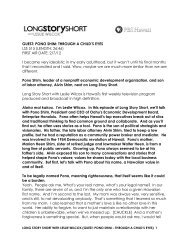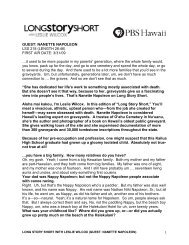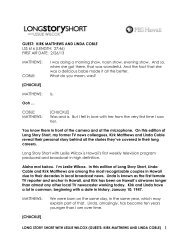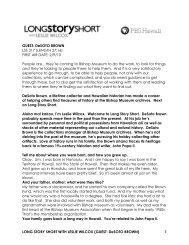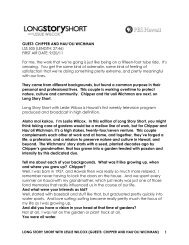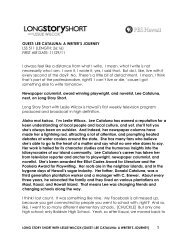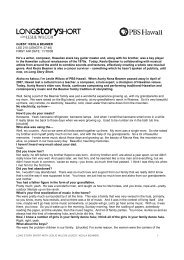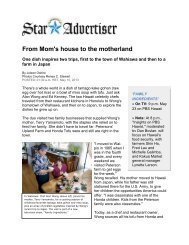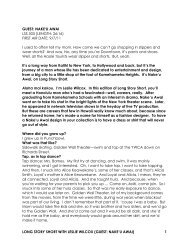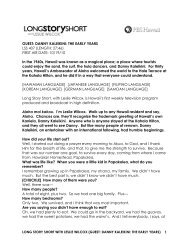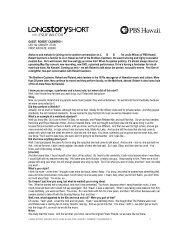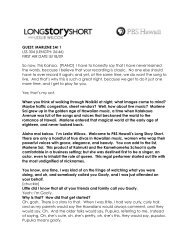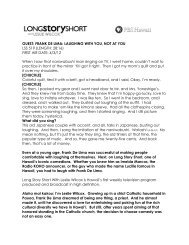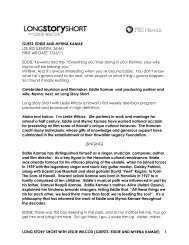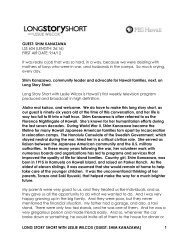guest: puakea nogelmeier on the hawaiian language - PBS Hawaii
guest: puakea nogelmeier on the hawaiian language - PBS Hawaii
guest: puakea nogelmeier on the hawaiian language - PBS Hawaii
Create successful ePaper yourself
Turn your PDF publications into a flip-book with our unique Google optimized e-Paper software.
priests understood, that allowed <strong>the</strong>m to memorize. Something two thousand<br />
lines is a lot to remember.<br />
You touched up<strong>on</strong> this a little before. But tell me about ka<strong>on</strong>a.<br />
You know, it comes up a lot. ‘Cause people think that ka<strong>on</strong>a is like <strong>the</strong> hidden<br />
meaning. If I’m talking about let’s say, Ahulili is a s<strong>on</strong>g over <strong>on</strong> Maui. [SINGS] He<br />
aloha no o Ahulili, he lili paha ko iala. And it’s a s<strong>on</strong>g about <strong>the</strong>se puu in <strong>the</strong><br />
Kipahulu district, and it’s about this puu is jealous, ‘cause all <strong>the</strong> o<strong>the</strong>r puu, <strong>the</strong><br />
mist comes down and settles <strong>on</strong> <strong>the</strong>m. So that’s <strong>the</strong> s<strong>on</strong>g. People think <strong>the</strong><br />
ka<strong>on</strong>a is that some girl or guy looks around, and everybody else is getting some,<br />
and <strong>the</strong>y’re not, so <strong>the</strong> jealousy is that, and that that’s <strong>the</strong> ka<strong>on</strong>a. And I would<br />
disagree that that’s <strong>the</strong> underlying meaning, and that’s really presented pretty<br />
fairly. Writing a s<strong>on</strong>g about a jealous mountain would be kind of an odd thing.<br />
Using it as a metaphor or as an analogy for some jealous pers<strong>on</strong> who’s doing<br />
this. So all <strong>the</strong> o<strong>the</strong>r mountains are getting mounted or puus are getting<br />
mounted by <strong>the</strong> mist, and it’s a funny s<strong>on</strong>g. The real ka<strong>on</strong>a to that—‘cause<br />
Kawena Pukui says nobody can understand ka<strong>on</strong>a. But I can understand this. I<br />
mean, this is pretty apparent. Anybody reading <strong>the</strong> liner notes can—<br />
So that’s not ka<strong>on</strong>a.<br />
So ei<strong>the</strong>r Kawena is wr<strong>on</strong>g, or that’s not ka<strong>on</strong>a. And Kawena is right. What she<br />
describes is, she says <strong>the</strong> ka<strong>on</strong>a is really <strong>the</strong> story that launched that s<strong>on</strong>g. The<br />
ka<strong>on</strong>a is what <strong>the</strong> poet knew. This is just a story about, you know, anybody will<br />
be jealous when <strong>the</strong>y see everybody else is getting—<br />
M-hm.<br />
—what <strong>the</strong>y want, and <strong>the</strong>y’re not getting it. The ka<strong>on</strong>a in this s<strong>on</strong>g is what<br />
inspired that poet to write <strong>the</strong> s<strong>on</strong>g. He knew a girl who was in this setting, and<br />
her name was Lucy, and she da-da-da—<br />
So that requires fur<strong>the</strong>r research outside <strong>the</strong>—<br />
It may—<br />
—<strong>the</strong> s<strong>on</strong>g.<br />
—never be known outside of <strong>the</strong> circle of <strong>the</strong> poet and those that are real close.<br />
And I really understand. I compose music. And mine have oft times a literal<br />
meaning, and most of mine are rascal pieces and <strong>the</strong>y’re, da-da-da, and <strong>the</strong>y<br />
have some sexual innuendos or what. And everybody gets those and <strong>the</strong>y<br />
laugh. That’s not <strong>the</strong> ka<strong>on</strong>a. And I understand this, that, <strong>the</strong> ka<strong>on</strong>a really is <strong>the</strong><br />
night that happened, that made me think of this, that made me develop this.<br />
The ka<strong>on</strong>a is <strong>the</strong> seed that made that piece come about. It was c<strong>on</strong>fusing for<br />
me for a l<strong>on</strong>g time. I teach a class <strong>on</strong> <strong>Hawaii</strong>an poetry, <strong>on</strong> <strong>the</strong> structures within<br />
and what not. So we’re always trying to address this.<br />
I have to think that <strong>Hawaii</strong>an poetry does not involve rhyming, ‘cause almost<br />
everything would rhyme.<br />
[chuckle]<br />
Wouldn’t it?<br />
LONG STORY SHORT WITH LESLIE WILCOX<br />
(GUEST: PUAKEA NOGELMEIER ON THE HAWAIIAN LANGUAGE)<br />
8



